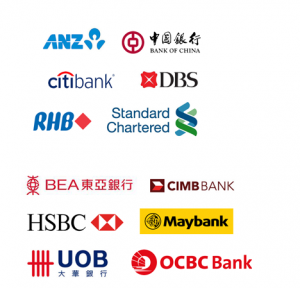Ratings agency Moody’s said on Monday that Singapore banks will benefit from tighter regulations to cool property market. In noting the Monetary Authority of Singapore (MAS), Ministry of Finance, Ministry of National Development and Ministry of Trade & Industry instituted new regulations to cool Singapore’s property market price appreciation and transaction volume, the rating agency said “higher minimum cash down payments, an additional buyer’s stamp duty and lower loan-to-value (LTV) limits will reduce speculative demand for residential properties and increase banks’ buffers if and when property prices fall significantly.”
<TO FIND THE BEST HOME LOANS IN SINGAPORE CLICK HERE>
“We believe the new measures reduce the risk of a property price bubble, future price shocks and losses from mortgage loans, which is credit positive for Singapore’s banks,” the agency said.
Moody’s noted that “private residential property prices began to climb in June 2017 and price appreciation accelerated in the first half of this year. By 30 June, property prices were up 9.1% from a year earlier, reaching a four-year high. Transaction volume has also increased sharply since June 2017, reflecting strong demand driven partly by brisk collective apartment “en-bloc” sales.”
In the first half of this year, the demand for private residential properties led to diverging price trends between the private residential property market and HDB flats, which is less prone to speculation.

The ratings agency expects that the new measures will dampen bank loans for residential property purchases and the resurgence of investment and speculative purchasing. It also expects the measures will improve newly originated housing loans asset quality amid Singapore’s rising interest rate environment and strong supply pipeline of Singapore banks.
At the end of March 2018, the three large Singapore banks, DBS Bank Ltd., Oversea Chinese Banking Corp. Ltd. and United Overseas Bank Limited had 42%-50% of their loan portfolio exposed to the property sector, including housing loans.
Moody’s said: “We expect household loan delinquencies to remain low because macro-prudential measures (particularly the introduction of the total debt-service ratio cap of 60% in June 2013) have constrained household credit growth and excessive borrowing.”
Adding: “Singapore households as a whole have a very strong net asset position, which, at least for asset-owning households, will provide an extra buffer to service their debt. At the end of 2017, total household financial assets were more than 3.5x household liabilities.”
The system-wide nonperforming loan ratio for mortgages was 0.4% at year-end 2017, with banks having a low average mortgage LTV ratio of 53%.
Fewer than 5% of mortgages currently have LTV ratios exceeding 80%, and Singapore banks have not been allowed to originate housing loans at such high LTV ratios since 2013. Although Singapore banks are expected to emerge unscathed by the new property curbs it is expected to have an impact on loan growth.
DBS had earlier said that “loan growth sentiment will be dampened from here as this is currently driven largely by property development companies. Mortgage growth might still stay relatively stable over the next few quarters from existing drawdowns.”
The new property curbs’ effects on developers, investors and second home buyers on the other hand is a different story. The new cooling measures are already being challenged by leading property developers here.
The combined impact of these new property cooling measures “raises the cost of ownership on an assumed $1.5 million property purchase by $75,000 (first-time buyer) and $150,000 (investor),” noted DBS analyst Derek Tan.
He added, “with the increased upfront capital commitment, we expect demand from investors and foreigners to cool in the immediate term. In terms of sales momentum, we expect total volumes to fall to 9,000-10,000 units in 2018, and potentially even further if these curbs remain.”
Paul Ho, chief mortgage consultant at the icompareloan.com, said that even with the new property curbs it was still not impossible for home buyers, investors and foreigners to find best home loans and save thousands (if not hundreds-of-thousands of dollars) in loans from Singapore banks.
He added that the unpredictable nature of if a bank loan would be approved after the announcement of the new property curbs is one major reason why buyers must use the services of mortgage consultants.
Ho said: “Mortgage consultants will be able to assess the buyers Mortgage Service Ratio (MSR) and Total Debt Servicing Ratio (TDSR) to gauge the buyers’ financial risk profile and advise on a suitable loan package. This will save them the hassle of running around, going to a bank that does not offer a loan for their housing type or ther personal profile, – not knowing what documents are needed, having to make 5-10 loan application and even the possibility of impacting the process of your home purchase.”
The new property curbs were rolled out on Thursday evening, one day after the Singapore’s central bank noted “euphoria” in the market. The new property curbs affected the Straits Times Index which dropped 2 per cent on Friday as property developers and banks led declines.
Under the new cooling measures, foreign purchases of residential property, the additional buyer’s stamp duty has been raised to 20 percent from 15 percent, while for Singaporeans the extra charges apply only from their second home purchase, the Monetary Authority of Singapore, Ministry of National Development and Ministry of Finance said in a joint statement on Thursday.
<TO FIND THE BEST HOME LOANS IN SINGAPORE CLICK HERE>
If you are concerned about how the new property cooling measures will affect you in getting a loan from Singapore banks, our Panel of Property agents and the mortgage consultants at icompareloan.com can advise you. The services of our mortgage loan experts are free. Our analysis will give industrial property loan seekers better ease of mind on interest rate volatility and repayments.
Just email our chief mortgage consultant, Paul Ho, with your name, email and phone number at paul@icompareloan.com for a free assessment.

